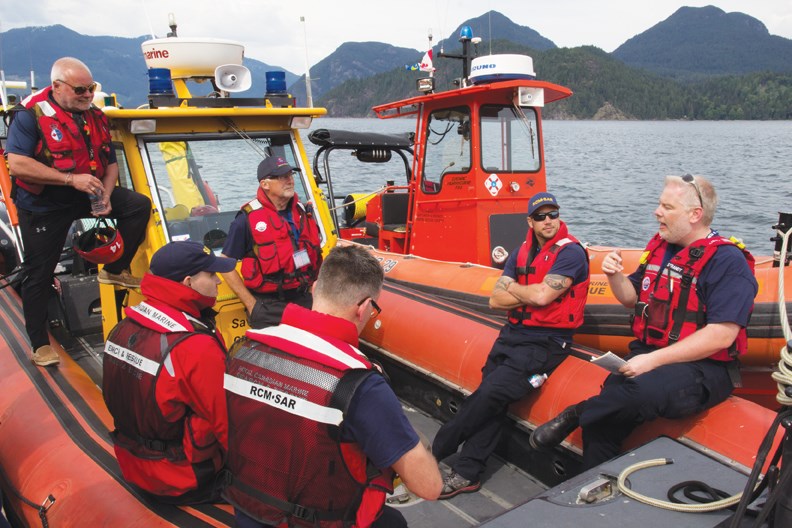Royal Canadian Marine Search and Rescue (RCM SAR) stations from up and down the West Coast – and as far away as Ontario – were at YMCA Camp Elphinstone in Langdale to participate in a series of training seminars from May 13 to 15.
The weekend seminars incorporated classroom sessions along with live action search and rescue scenarios, such as treating a person with hypothermia and towing a stranded boat back to shore.
“Today is really about taking these guys and standardizing our training practices, refining them, making sure that people know what they’re doing and that it’s consistent across stations,” national president for the Canadian Coast Guard Auxiliary, Randy Strandt, said.
Out of the 40-plus RCM SAR stations in British Columbia, 23 stations had members in attendance – plus an additional station from Pickering, Ont. In total, a little over 150 SAR volunteers were involved.
Strandt and François Michaud, from RCM SAR in East Sooke, worked out a training scenario where SAR volunteers had to rescue a boat in distress and tow it back to safety.
“Basically what we’re analyzing is the decision-making process from the coxswains and how they delegate to the crew they have available,” Michaud said.
“We’re trying to mix and match the people from different stations, which reinforces the need for standard operating procedures,” Michaud said. “So if we all train the same way, it doesn’t matter who we’re doing the scenario with. We can communicate the standard operating procedures – whether it be towing or dewatering or damage control. It’s all done pretty much the same way, with the same fundamentals.”
Strandt said he thinks the debriefing after the scenario is – in a way – even more worthwhile than the training drill itself.
“What went well, what the crews really excelled at – but perhaps more important is what we did not do as well at but would like to better,” Strandt said. “Going through that, the crews really learn a lot.”
The RCM SAR volunteers from Pickering paid their way across the country to attend. Coxswain and unit leader Chris Webb said it was “absolutely worth it.”
“We’ve toured around to four other stations and just seeing how they work – I mean, obviously the equipment is fantastic, but even the processes and how they do their business and whatnot – because we’re a little bit more independent in terms of the units there, we’re a bit more on our own to develop these sorts of processes,” Webb said. “That’s why we put the investment in to come out.”
Ian Grantham, coxswain at Station 1 in West Vancouver, said that bringing everyone together like this also does a lot for morale within SAR stations.
“There are not a lot of opportunities where we can get this many boats and this many crews together,” Grantham said. “Bringing people from all up and down the coast to one place, to learn the same things, is excellent. It does really good work for us. But the best part of it all – other than the exercises – is just sitting up there, having lunch together, having a beer or two together,” Grantham said. “That’s what makes it so special, I think.”
Visit www.coastreporter.net to see more photos from the RCM SAR weekend.



